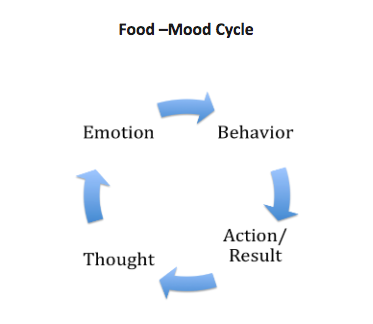Typical binge foods tend to be composed of refined sugars, high in carbohydrates and high in fat. For instance, people who binge eat generally don’t binge on foods like fruit or vegetables, but rather on foods at quantities like gallons of ice cream, donuts, pasta, cookies, cake, burgers, and other forms of low-nutrient foods (all at larger-than-normal quantities). During the binge, the out-of-control feeling is often so great that the individual often feels unable to control the compulsion, similarly to an addiction, and often finds relief only after having engaged in the binge. The conscious and subconscious thoughts of eating often associated with this behavior may in part be attributed to the fact that those who struggle with binging tend to choose not eat much in public because of a sense of embarrassment around their disordered eating behavior.
If you are someone who goes into work early in the morning and doesn’t leave until late at night, you might not really eat much all day and then arrive home naturally feeling starved, anxious and irritable, you are more likely going to engage in a binge when you arrive home and feel you have the privacy to eat. However, if you allow yourself to eat a complete, nutritious dinner, then even a light snack a few hours later, and if you go to bed at a reasonable time, you will put yourself in a much better position to avoid that binge late into the night.
This brings us to the next negative behavior: not getting enough sleep. You’ve all heard that you should get eight hours of sleep every night to be the most productive and the healthiest individual you can be, right? While not all of our jobs allow us to get this much sleep, you should be getting at least six on the average night. Inadequate sleep leaves you groggy, fatigued, unproductive, irritable, and unable to concentrate. Set a time to aim to get to bed by, like 11:00 pm and try it. Feel the difference between how your body feels when stripped of rest and how your body feels when you go to bed earlier. It might take a few days of adequate sleep to feel a significant difference, but eventually, the net difference in your health will be worth it.
Individuals who binge eat tend to find comfort in knowing that they can eat alone without feeling judged. However, after the binge he or she usually experience very negative feelings of guilt, shame, physical discomfort, a need to fall asleep which may also be companied with a temporary sense of relief in anxious or irritable emotions, sense of calm or sense of “feeling high”. Although the individual may experience positive emotions after the binge, the act of binging is likely to be accompanied with feelings of guilt and out-of-control behavior, which often causes the individual significant long-term emotional distress. The psychological and emotional distress often feeds into a sense of dissatisfaction and deprivation, when attempting to restrict eating during the day, which commonly leads to the disordered eating cycle repeating itself.
See the Food-Mood Cycle diagram below.

As you can see in the diagram above, if we begin at “thought,” we see that a thought leads to an emotion, which then leads to a specific behavior, and is then followed by an action or the result of a given behavior. All individuals work this way, despite if this is a negative behavior or a positive behavior. The problem is, with disordered eating such as binging, these thoughts are negative, which lead to a cascade negative emotions that only support a great feeling of loss- of-control and feeds back into the binging behaviors.
This can be a never-ending cycle until you change the way you think!
The goal is to turn your negative thoughts into positive ones. However, for any of you who have struggled disordered eating or know someone who has, you likely know that changing negative thoughts is not easy, and it sure doesn’t happen overnight. Instead of immediately thinking to yourself ‘this is hopeless…I will never feel free of this constant battle and obsession around food’, try following some of the tips below to stop binge eating.
Tips to stop Binge Eating
- Write down how you feel-Keep a journal of these thoughts and the emotions that follow them. Whenever you have a negative thought about yourself, write it down. Say how you feel. By cathartically writing down these thoughts and emotions, you will begin to familiarize yourself with them and recognize them when they happen.
- Stop Restricting– Research has concluded that once individuals get off the diet, post weight-loss, there is a 95% recidivism rate within the first two years. Giving yourself “permission” to indulge in treats every once in a while will enhance your body’s ability to sustain a healthy weight by preventing binges.
- Eat a variety of healthy fats, some carbohydrates, & protein– As a general good rule of thumb, half of the servings of your three main meals (breakfast, lunch and dinner) should be comprised of fruits and vegetables.
- Seek professional help from an Eating Disorder Behavioral Therapist and Dietitian– If you or someone you know is struggling with binge eating, take the first step to reach out to an eating disorder behavioral therapist who can help. Though initially it may seem scary, the guidance will comforting and helpful. It’s also helpful to know that you are not alone. Other people just like you are feeling the same way. Many treatment centers provide group-therapy sessions, which provide a nonjudgmental, supportive environment. Check out our website here for more information: https://behavioralnutrition.org/binge-eating/.



